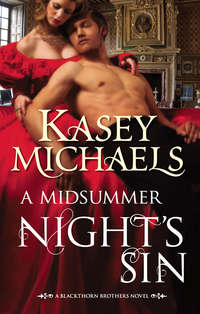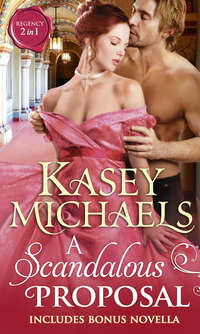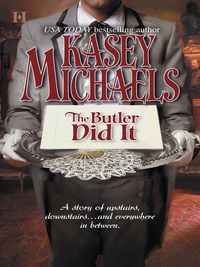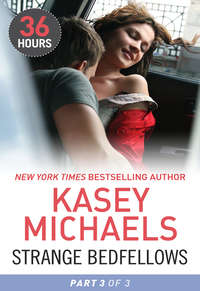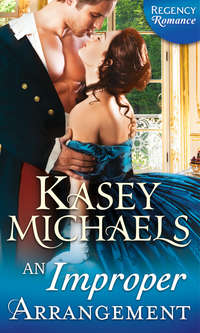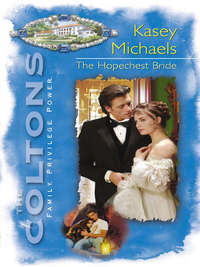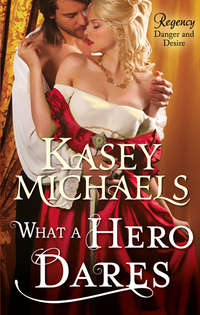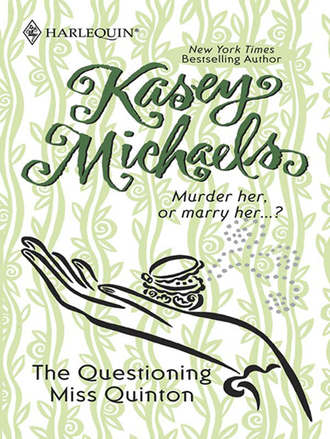
Полная версия
The Questioning Miss Quinton
She was just about to open her mouth and apologize for having behaved so shabbily when Sherbourne, who had just interrupted his latest move toward the front door as a sudden thought occurred to him, whirled to point a finger in her face and demand: “Pierre Standish, Miss Quinton. Humor me, if you please, and speculate for just a moment—what possible reason could he have had for putting a period to your father’s existence?”
“Who is M. Anton Follet, Lord Wickford?” was Victoria’s maddening reply.
Patrick inclined his head slightly, as if acknowledging a flush hit. “Ah, madam, such deep intrigue. I do so love cryptic questions, don’t you?” His smile was all admiration as he ended silkily, “If this is a sample of your sleuthing, however, I suggest you repair to your knitting box without further delay.”
“I don’t knit.”
Patrick’s eyes closed in a weary show of despair. “This, I believe, is where I came in. And, madam, this is where I depart. Good day to you, Miss Quinton.”
So saying, Sherbourne opened the front door and let it close softly behind his departing back.
It wasn’t until his coach (the one with the gilt coat of arms on the doors) had delivered him to his own doorstep that Sherbourne realized he was more than just extremely angry. He was also confused, upset, and intensely curious about Pierre Standish, M. Anton Follet, Quennel Quinton, Miss Victoria Quinton’s bizarre scheme, and the identity of the Professor’s murderer.
It did not occur to him that the one thing he was not was bored.
CHAPTER THREE
“WHAT AN ODIOUS, odious man!” Victoria Quinton told the empty foyer once the Earl of Wickford had departed, having gained for himself—although it pained her, she had to acknowledge it—the last, telling thrust in their war of words. For at least one fleeting moment during their conversation she had felt the same impotent fury she had invariably experienced on the rare occasions when she had gone up against the Professor in a verbal battle before she had at last decided that she really didn’t care enough about her father’s view of life to try to convince him of her side on any subject.
Crossing the foyer to enter the small, shabby drawing room that—as the Professor had rarely visited it—she considered her own, Victoria walked over to stand directly in front of the wall mirror that hung above a small Sheraton side table, one of the few fine pieces of furniture that her mother had brought to the marriage.
The mirror hanging above it, on the other hand, was a later purchase of the Professor’s, and it was exquisite only by way of its ornate ugliness. Peering through the virtual forest of carved wooden decoration that hemmed the mirror in from all sides, Victoria did her best to examine the features she saw reflected back at her.
“‘Not a face that would be enhanced by a maidenly show of tears,’” she quoted, tilting her head this way and that as she leaned closer for a better view, as Victoria was markedly shortsighted without the spectacles she had chosen not to wear that afternoon.
“What Lord Wickford left unsaid was that if I had been so foolish as to ask him what would enhance my looks, he would have immediately suggested the prudent disposition of a large, concealing sack overtop my head.” She smiled in spite of herself, causing a dimple Patrick Sherbourne had not been privileged to see to appear in one cheek, lending a bit of humanizing animation to her usually solemn face.
Putting a hand to her chin, she turned her head slowly from side to side once more, objectively noting both her positive and negative features. “The eyes aren’t all that depressing, if I can only remember not to squint at anything beyond the range of ten feet.” she mused aloud. “Although I do wish my brows were more winglike and less straight. I always look as if someone has his hand on the top of my head, pushing down.”
Squinting a bit as she moved almost nose to nose with her reflection, she continued her inventory. “Nose,” she began, wrinkling up that particular feature experimentally a time or two. “Well,” she concluded after a moment, “I do have one, not that it does much more than sit there, keeping my ridiculously long eyes from meeting in the middle, while my skin certainly is pale enough to pass inspection, although I do believe I should have considerably more color than this. In this old black gown I look less like one of the mourners and more like the corpse.”
She stepped back a pace and deliberately pasted a bright smile on her face, exposing a full set of white, even teeth surrounded by a rather wide, full-lipped mouth that did not turn either up or down at the corners. Her neck—a rather long, swanlike bit of construction—did not seem to be sufficiently strong to hold up her head, and her small, nearly fleshless jaw, though strongly square boned, perched atop it at almost a perfect right angle, with no hint of a double chin.
Reaching a hand behind her, she pulled out the three pins holding up her long, dark brown hair, so that it fell straight as a poker from her center part to halfway down her back. “Ugh,” she complained to the mirror, ruefully acknowledging that, although her hair was a good length, it was rather thin, and of a definitely unprepossessing color. “How could anyone with so much hair look so bald?” she asked herself, trying in vain to push at it so that it wouldn’t just lay there, clinging to her head like a sticking plaster.
Then, holding her hands out in front of her, she inspected her long, slim, ink-stained fingers and blunt-cut nails before quickly hiding them again in the folds of her skirt. The Professor had told her repeatedly that her hands and feet were a disgrace, betraying physical frailty because of their slender, aristocratic construction.
“How I longed all through my childhood for a knock to come at the door and for someone to rush in to tell me that I wasn’t really Victoria Quinton but a princess who had been stolen away by gypsies and sold to the Professor for a handful of silver coins,” she reminisced, smiling a bit at the memory. Having no real recollection of the mother who had died while her only child was still quite young, Victoria had resorted to fantasy to explain away her unease at being unable to love the strange man who was her father. “Oh well,” she acknowledged now with a wide grimace, “if my aristocratically slender bones didn’t gain me a royal palace, at least they saved me from being hired out as a dray horse in order to bring a few more pennies into the house.”
That brought her to the point she had been dreading, an inventory of her figure. “What there is of it,” she said aloud, giving an involuntary gurgle of laughter. Victoria might have inherited her above-average height from the Professor, but she had been blessed—or blighted, according to the Professor, who would have liked it if she could have been physically suited for more of the housekeeping duties—with her mother’s small-boned frame and inclination to thinness.
“Skinny as a rake, and considerably less shapely,” she amended, as her reflection told her clearly that the only things holding up her gown were her shoulders.
Victoria closed her eyes for a moment, sighed deeply, then lifted her chin and began twisting up her hair, fastening the anchoring pins with a total disregard for the pain her quick movements caused. “Point: Victoria Quinton, spinster, is an antidote,” she declared, staring herself straight in the eyes. “Point: Mr. Pierre Standish insulted me openly and then all but cut me dead. Point: The Earl of Wickford did not hesitate in revealing to me his distaste for women of my sort.” She stopped to take a breath, then ended, “Point: I don’t care a snap about the first three points.
“Mr. Standish is a soulless devil, everyone knows that, and the Earl—well, he is the most excessively disagreeable, odious man I have ever met, not that I have even spoken to above two or three of that unimpressive gender in my entire life. I don’t care a button what they think, and I am well shed of the pair of them!” She nodded her head decisively and her reflection nodded back to her.
She felt fairly good about herself and her deductions for a moment or two, until her mind, momentarily blunted by this rare display of self-interest, stabbed at her consciousness, rudely reminding her that she did need them. If she were ever to solve the puzzle of just who murdered the Professor, she needed them both very much.
Even worse, she acknowledged with a grimace, she needed to do something—something drastic—about making herself over into a young woman who could go about in public without either spooking the carriage horses or sending toddlers into shrieking fits of hysterics.
The two men who had been in the house in Ablemarle Street were not her only suspects—although they did for the moment stand at the head of the list of society gentlemen she had thus far compiled—and she must somehow inveigle introductions to certain others of the ton if her plan to ferret out the murderer was to have even the slimmest chance of succeeding.
Victoria pressed her fingertips to her temples, for she could feel a headache coming on, and looked about the room, searching for her spectacles. She still felt slightly uneasy about her decision not to wear the plain, rimless monstrosities, unwilling to recognize maidenly vanity even to herself, and decided to blame the insufferable Earl of Wickford, and not her foolishness, for the dull thump-thumping now going on just behind her eyes.
How she longed for her cozy bed and a few moments’ rest, for she had been sleeping badly ever since the Professor’s death three days earlier, but she discarded the idea immediately. “The Professor would have kittens if I dared to lie down in the middle of the afternoon,” she scolded herself sternly. Although she had never been afraid of the man, she had found it easier to keep her thoughts to herself and display an outward show of obedience, thus saving herself many a lecture.
But then, just as she was about to head for her work-basket that stood in the corner and the mending that awaited her there, she brought herself up short, and a small smile lit her features. “And who’s going to run tattling to him, Miss Quinton, if you do take to your bed—Saint Peter? You are your own mistress now, my dear,” she reminded herself, a bit of a lilt coloring her voice. “You have longed for this day, dreamed about it for years, and now—through no fault of your own—it is here. You are free, Victoria Quinton, free to do whatever you will!”
Pivoting smartly on the heels of her sensible black kid half boots, she exited the small drawing room in a near skip, heading for the staircase.
It was perhaps only a small act of rebellion after so many years of doing only what she was told, but it was to set a precedent for the future.
CHAPTER FOUR
PATRICK HALTED on the threshold of the club’s sedately decorated main salon and looked about for Pierre Standish, finally locating his quarry sitting alone and looking very much at his ease near one of the large floor-to-ceiling windows that overlooked the busy street below.
Sherbourne did not take himself immediately to that side of the room. Instead he spent several minutes wandering about in a seemingly aimless fashion, passing the time of day with some of his friends, although declining to sit and take refreshment with any of them.
He even took the time to place a wager with Lord Alvanley on the outcome of a mill that was to be held in the countryside later that week, before eventually arriving at his planned destination and sliding into a facing wing chair, a jaunty greeting on his smiling lips.
“Tsk, tsk. That took you precisely three minutes longer than it should have, my darling Patrick, although, in general, it was rather well done,” Standish drawled amicably before returning his large gold watch to his pocket and looking up at Sherbourne for the first time.
“I beg your pardon, Pierre?” Patrick questioned, keeping a carefully blank look on his face as he adjusted his coattails before crossing his legs at the knee, allowing one elegantly fashioned Hessian to dangle.
“Yes, I believe you should,” Standish answered smoothly as he motioned to a servant who was hovering nearby to fetch another glass for his lordship. “I recall that I have urged you to find an interest, my darling, but I fear your future does not lie in cloak-and-dagger machinations.”
Patrick shook his head in admiration, admitting defeat. “How did you know I was looking for you particularly? I thought I was being quite smooth, actually.”
Pierre took up the glass the servant had brought and poured some rich-looking red liquid into it from a decanter before handing the glass to Wickford. “I could, I suppose, say I have visited a wizened old gypsy in Europe who—because of some heroic service I rendered her—has given me the gift of foretelling events, causing you to look at me in awe, but honesty prevents me. Actually, dearest, I was at home when you called this morning but—how shall I say this without being indiscreet?— I was considerably engaged at the time.”
Taking a small sip of his wine, Patrick leaned back in his chair and quipped mischievously, “My deepest apologies. I can only pray that I didn’t interrupt at a critical moment? Some indiscretions have so little understanding of the link between concentration and performance.”
Pierre’s dark eyes twinkled slightly in his otherwise emotionless face. “I have amazing powers of concentration, thankfully. Besides, Patrick, you know I have always made it a point never to disappoint a lady.”
Patrick acknowledged his understanding with a slight nod of his head, knowing better than to dwell on the subject. Besides, he had not sought out Standish merely to spend a few pleasant minutes enjoying the verbal sparring that helped pass the time between noon and an evening’s entertainment. “Speaking of ladies, Pierre—”
“Not I, my dear, at least not literally,” Standish said, a smile still lurking in his eyes.
Patrick chose to ignore this last statement, knowing that Pierre could keep a conversation jogging along in this lighthearted vein forever, without once saying anything to the point. He had met with his friend for a reason, and it was time the two of them got down to serious business. “There’s something I think you should know, Pierre. Miss Quinton believes her father knew his murderer,” he announced baldly, watching his friend closely for any reaction.
Pierre did not so much as blink. “How utterly amazing. I am, of course, astonished,” he said in a tone that totally belied his statement.
“As usual, my friend, you react by not reacting. Perhaps a bit more information is required.” Leaning forward a bit so that he could speak without fear of being overheard, he went on confidingly, “Does the fact that this same Miss Victoria Quinton considers you and me to be her prime suspects pique your interest in the slightest?”
“Are we, by God?” Standish responded, raising his dark brows a fraction. “I begin to believe you have awakened a slight curiosity on my part—perhaps even the faint glimmerings of interest. Perhaps you will oblige me by beginning with how you have come upon this charming little tidbit of information.”
Patrick leaned back in the chair once again, satisfied at last with his friend’s response. “The lady in question told me herself the day of the funeral, not that she wanted to, you understand.”
“It’s that pretty face, Patrick,” Pierre interrupted, an earnest expression on his dark face. “I’ve noticed before the devastating way you have with the ladies. I imagine you’ve heard quite a few things over the years. Have you ever thought of writing your memoirs?”
“It was not my pretty face that did it, but her own satisfaction with her deductions that had her flinging her outlandish theory at my feet like a gauntlet,” Sherbourne corrected testily. “Lord, man, at first she attacked me like a hound on a blood scent, trying, I believe, to frighten me into confessing.”
“Quite the little Trojan, hmmm?”
“Quite the little idiot,” Patrick amended. “She’s taken it into her head to solve the mystery of the Professor’s murder, you see, and believes the answer might lie somewhere in the papers I’ve inherited.”
“And your thoughts on the subject?” Standish prodded, reaching for his wineglass.
Patrick smiled slightly, shaking his head. “I think the lady in question is a bit queer in her attic. Quinton was killed by a burglar; everybody knows that.”
“Do they?” The question held no inflection, hinted of no hidden curiosity. It was just as if Standish, like Miss Quinton, had thrown out a suggestion, and now was waiting to see if his friend was going to pick it up.
Patrick slowly twirled the glass in his hand by its slender stem, watching the small bit of wine swirl around the bottom in a tight whirlpool as he considered Pierre’s question. At last he raised his head a fraction, staring intently into the other man’s eyes.
“Yes, darling?” Standish purred.
“Victoria Quinton may have the disposition of a cursed warthog—and a face to match—but she’s sharp as needles, Pierre. Much as it pains me to admit it, I can’t simply dismiss her assertions as daughterly grief. It’s—it’s as if she considers what she’s doing as some sort of duty. Do you know, Pierre, I don’t think she loved Quinton—or even liked him.”
“Quennel Quinton was many things as I recall, but I know I did not find him to be especially lovable. Perhaps I have underestimated our little drab. She must have some intelligence,” Pierre put in thoughtfully.
Patrick nodded in agreement. “A dedicated bluestocking, I’d say, which is why I cannot comfort myself by believing her theory to be some romantic bag of moonshine she’s embraced merely in order to lend some sparkle to her humdrum existence. She’s just not that sort of female.”
Pierre directed a long, dispassionate stare at the man facing him before speaking again, all trace of mockery now gone from his voice. “You seem to have given our dowdy Miss Quinton and her assertions quite a bit of thought, Patrick. Perhaps you have even begun to question the reasons behind the Professor’s demise yourself. Tell me, my dear, is this to be an intellectual exercise only, or do you plan to do something about it?”
Patrick lapsed into silence once more, absently raising his wineglass to take a drink before realizing it was empty, and then holding it out as Pierre refilled it from the decanter. Lifting the glass to his lips, he then downed its contents in one long gulp before rising to his feet. “She’s a damned obstinate woman, Pierre, and she’s deadly serious about this foolishness she’s taken into her head. Somebody has to watch out for her, or she’ll land in a scrape for sure.”
Pierre put down his glass and applauded softly. “Congratulations, my darling man. You have come to exactly the correct decision. But do be careful, Sir Galahad—lest the lady decides to view her benefactor in a romantic light. You may save her from carelessly falling into the hands of a desperate murderer, only to have her end up casting herself into the Thames for love of you.”
“Don’t worry about that, Pierre,” Patrick assured him. “Victoria Quinton hates the sight of me. She thinks I’m a terrible, shameless person. Useless too, I believe she said.”
“I wait with bated breath, my dear one, to hear your opinion of her opinion.”
Patrick slipped a snow-white lace handkerchief from his cuff and daintily dabbed at the corners of his mouth in imitation of one of his friend’s little affectations before answering: “I was flattered, of course, my dear Pierre. What else could I be?”
CHAPTER FIVE
“YOU’RE LOOKING kinda peakedlike, Miss Victoria,” Wilhelmina Flint remarked a week after the Professor’s funeral as she lifted yet another stack of papers from the desk in the library in order to run her feather duster over its shiny surface. “Why don’t I run myself on down to the kitchens and brew you up some of my black currant tea onc’t I’m all finished puttin’ this mess to rights?”
“Finish it, Willie?” Victoria questioned lightly, leaning back in the Professor’s big leather chair to look up at the hovering housekeeper. “The only way this room could possibly get any cleaner would be if you were to dump all the furniture into the garden and whitewash the walls. Didn’t you just dust in here this morning?”
Willie raised her chin and sniffed dismissively, although she wasn’t really offended by her young mistress’s words, considering that she had raised Miss Victoria since the girl was just out of soggy drawers and had therefore long ago become accustomed to her genial attempts to belittle her own love of cleanliness and order.
“Go away with you now, Missy,” she said, going on with her work, which for the moment meant she was concentrating on chasing down yet another daring bit of lint that had somehow escaped her eagle eyes earlier.
While Wilhelmina tidied and fussed and generally stirred up more dust than her switching feathers could capture, Victoria sat at her ease, idly observing the hubbub as she gratefully abandoned her increasingly disquieting research for a few moments. Willie was a treasure, even with her seeming obsession with cleanliness, and Victoria knew it, just as she knew that the woman must never learn so much as the slightest hint of damning information coming to light about her longtime employer.
Although the housekeeper—who had left the countryside to be with her mistress in London when the Professor took the local squire’s only daughter to wife—had never tried to replace Victoria’s dead mother in her heart, Wilhelmina’s brisk efficiency had always been liberally laced with affection for the plain, awkward child who received nothing but the most cursory notice from her busy professor father. If Victoria confided in her now, Wilhelmina would put a halt to the murder investigation immediately!
Victoria had grown to love the tall, rawboned redhead, and as she grew older she had secretly coveted Willie’s buxomy, wide-hipped, narrow-waisted, hourglass figure, believing the housekeeper’s ample curves and brilliant coloring to represent the epitome of feminine beauty.
Even now, with the once vibrant red hair showing traces of grey, Victoria could still see much of the full-blown beauty that had once been Wilhelmina’s, and wondered yet again why she had never married. Surely there must have been plenty of opportunities. “Willie,” she ventured now, “tell me truly—there must have been someone you wished to wed, maybe some farmer back in Sussex before you moved here? I mean, you didn’t stay with us all these years just because of me, did you?”
The housekeeper stopped in the midst of rubbing a brass bookend with a corner of her starched white apron and peered intently at the serious young woman. “Because of you, Miss Victoria?” she questioned in a tone that hinted at the utter ridiculousness of such a question, then laughed out loud. “Lord love you, Missy, I should most certainly think not! It’s crazy in love I was with the dear, sweet Professor, of course. That’s why I stayed. It’s as plain as the nose on your face!”
Now it was Victoria’s turn to laugh, for if there were ever two people born to do murder to each other they were Wilhelmina Flint and Professor Quennel Quinton. Clearly Willie was doing her best not to load her young mistress down with yet another heavy dose of guilt, to be piled atop all the other guilt she was feeling over being unable to muster up any genuine grief over her father’s death.
“I may have led a sheltered life, Willie, but I’m not a complete greenhead,” Victoria reminded the housekeeper, sobering again. “You and the Professor were many things to each other, but none of them were even remotely connected to anything of a romantic nature.”
“You’re forgettin’, Missy. The Professor left me that fine miniature of hisself. Wouldn’t you be wonderin’ why he should do such a thing?”
Victoria sat front once more, placing her elbows on the desk. “That’s another thing that puzzles me, Willie. There’s something about that miniature that bothers me. I don’t ever remember seeing it before, for one thing, but it’s my inability to reconcile the miniature with the man I knew that is most difficult. I imagine it is hard to conjure up a real sense of recognition when faced with an image of one’s parent at an age closer to one’s own.”


